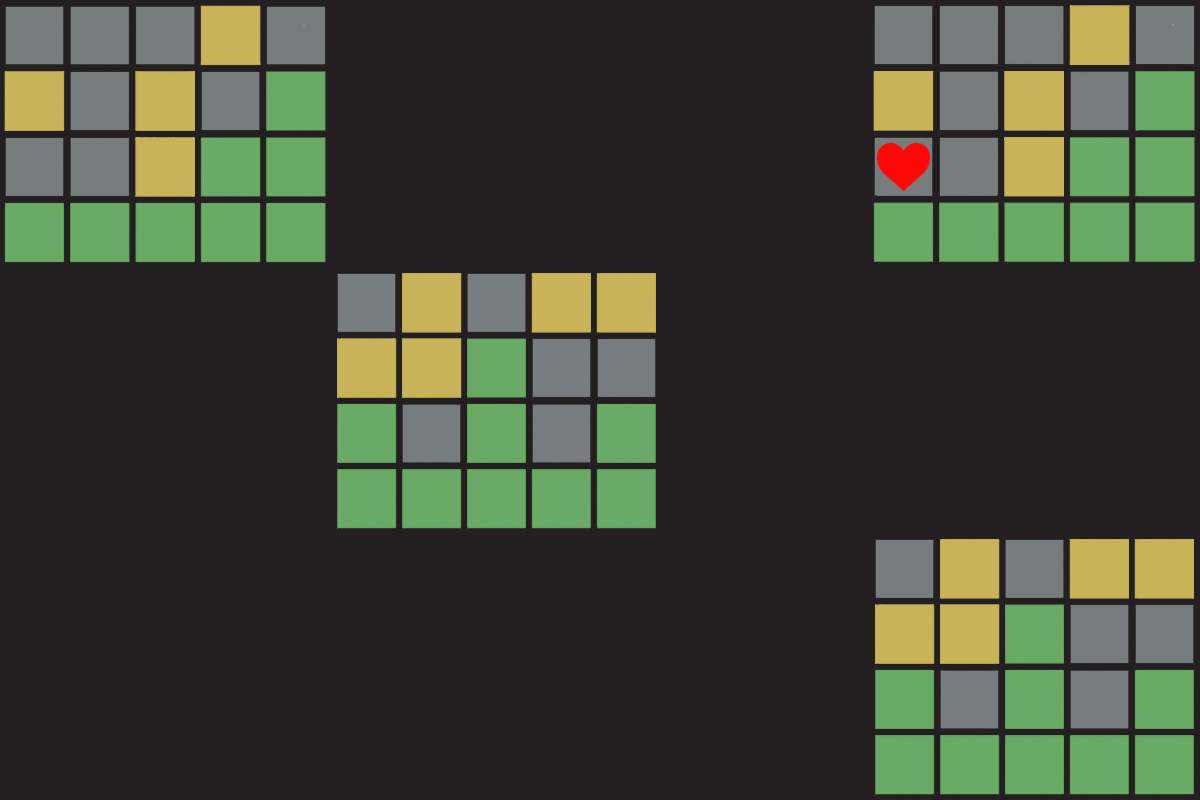Top image: Rice Media
As of today, my current Wordle statistics stands at 18 games played, with a current and maximum streak of 14 and a 100% win. What was once a mere curiosity has become something more akin to a habit—thirty minutes of forgetting the world’s troubles and digging deep into the recesses of my brain to crack a daily 5 letters puzzle.
Wordle, of course, is the game that has swept the world (and I don’t mean that figuratively) by storm with 3 million players around the world. The premise is elegantly simple; it’s almost laughable. You have six tries to guess a five-letter word. With each attempt, the game will let you know if a letter is in the right place (a green box), in the wrong place (a yellow box), or if it’s not in the word (a grey box, but also, tough luck).
ADVERTISEMENT
The game itself is the very definition of no-frills. There are no ads, no banners, no pop-ups, no plea for donations—zilch. There are, however, pertinent features such as a dark mode and, for the colour-blind players, a mode that gives the interface a high contrast. No one is tracking your visit, collecting data about you or mining your browser history to send you targeted ads. It’s just six rows of boxes with a keyboard docked at the bottom.
Tik-Tok can’t even.
Yet, it’s that very simplicity that makes Wordle incredibly intoxicating. In an online world that demands our attention at every turn, Wordle is like that soft, omnipresent low hum of a bus that asks little of the self. It’s also riveting that all the players have, as a shared collective, sworn themselves to Wordle secrecy, honouring a social contract every day to keep the joy alive. It’s the world’s greatest secret, this five-letter word of the day, an incredible feat given our propensity to share quickly and widely everything and anything we know.
Wordle’s overnight success has not gone unnoticed. Yesterday, the New York Times announced that they’d purchased Wordle for a low seven-figure sum, sparking fears that the beloved game will be locked behind a paywall. Josh Wardle, the creator, has since come up with a statement assuring fans that Wordle will remain free. Phew.
But what drew me to Wordle is not just in its simplicity but also in the story of its birth. It’s a love letter from former Reddit software engineer Josh Wardle to his puzzle-loving partner, Palak Shah. It’s a game borne as a way to kill time during the pandemic. Wardle and Shah let the world play this game for free and are now reaping the benefits of their generosity—generously.
See, that’s the thing about stories. On its own, Wordle is simply a fun game that redefines what it means to take a mental break out of everyone’s busy WFH days. But paired with a story about love, partnership, fulfilment, and love language, and suddenly the game, at least for me, takes on a life of its own. In some ways, it almost feels intrusive, my participation, in what was once, a mere few months ago, a thing of linguistic intimacy shared between two people whose photos I’ve never even seen till today. But I also feel partly responsible for keeping this paean alive and ensuring this love letter doesn’t fade out of our existence too soon.
All this talk about stories reminds me of an exchange I had with Alastair and Jon, the affable and inimitable hosts behind the ‘In My Opinion’ podcast who recently invited me to speak on content creation and censorship in the world of new media. Jon admitted that he’s not the type to read articles (I suppose that includes anything Rice publishes), eschewing videos and short clips for lengthier reads that takes time and commitment.
“How do you, as the editor of a media publication, reckon with a world filled with people like me?” he asks.
“It’s not that you don’t like to read, Jon,” I explained. “You just haven’t found the right story yet.”
Perhaps I’m biased given the position I’m in, but I do believe that we’re all always in an endless and constant search for the perfect story. Stories that align with what we stand for, that challenge what we know to be true, and give voice to the voiceless. It’s a task that grows increasingly challenging, especially for independent and alternative media houses like Rice that publishes stories we feel Singapore, and by extension, the world should be more keenly aware.
And as we fight for the same slice of attention amidst YouTube, Tik Tok, and Instagram, we are under no delusion that Rice can carry all the stories our loyal readers want. Still, we try. We work under many limitations, and as much as we want to publish each story in our burgeoning Ideas Bank, we know that it’s humanly impossible—for now.
Hopefully, one day, Rice will grow to be as big a news outlet as the New York Times, where we have scores of journalists, writers, and analysts creating stories that can cater to every readers’ whims and fancies. Where we, too, can see the potential a simple game as Wordle has and come on board to bring it to greater heights.
And if that comes true, you know you read it here first. And truthfully, I couldn’t think of anything more exhilarating than that. Till then, thank you for reading and for being a fan.



